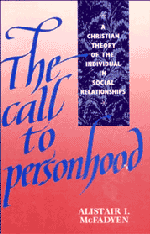8 - Political community
Published online by Cambridge University Press: 03 May 2011
Summary
Understanding and participation
As I argued in the opening chapters, God's interaction with us is dialogical in form. In communication God intends and informs our human being as an autonomous structure of response: we are autonomous subjects of communication responsible before God. Our constitution as persons through our relation with God, which requires social refraction and mediation, generates a specific conception of the person, which was elaborated in Part II. The form which God's communication takes is normative for practice in social relations, and I have already discussed the implications of such a view for the practice of small-scale interpersonal relations in which the free, reciprocated recognition and co-intention of the partners as autonomous subjects of communication becomes a norm for practice. But it was impossible to restrict the discussion to this level of social reality alone, since interaction of this kind is intimately intertwined with social structures and interactions at higher levels of organisation.
What is required now, therefore, is a similar theory which can ground the right practice of relations on a larger scale. In the political sphere, the dialogical norm for communication generates a formal principle for legitimating political practice and order: the extension of free and equal participation in a political structure or movement in which people are recognised, or rather structurally co-intended, as autonomous subjects of political communication. As participating subjects of and in political processes, people are acknowledged in both their freedom and their difference.
- Type
- Chapter
- Information
- The Call to PersonhoodA Christian Theory of the Individual in Social Relationships, pp. 206 - 230Publisher: Cambridge University PressPrint publication year: 1990

